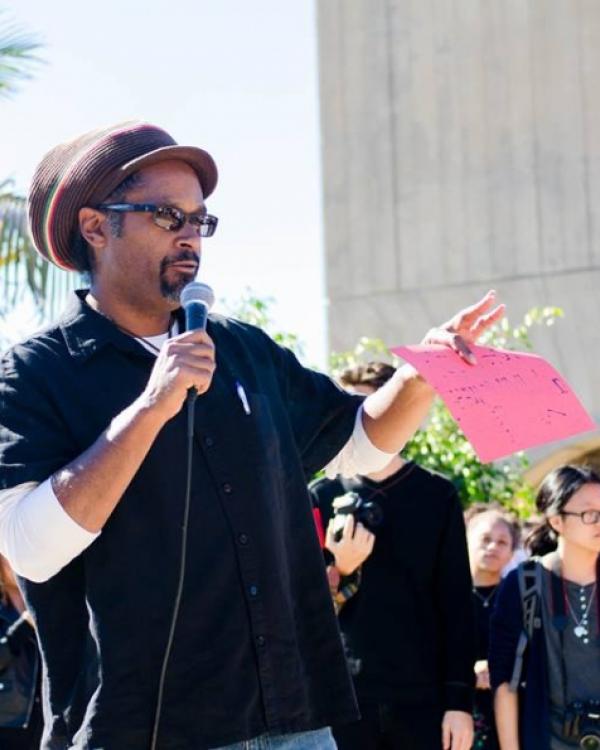
Aaron Jones will be receiving his Ph.D. from UCSB’s Department of Education with an emphasis in Educational Leadership and Organizations. Jones is the Director of the Educational Opportunity Program at UCSB. As a graduate student, he continued his legacy of service, advocacy and leadership at UCSB by serving as the President of the Graduate Student Association. He has also served as a co-host and programmer for “On The Real,” a public affairs/social commentary weekly radio show for KCSB-FM. Jones has a long affiliation with UC Santa Barbara. He has served as the Associated Students’ (AS) Assistant Director for Community Affairs, Civic Engagement & Advocacy. He was previously the AS Student Government/Recruitment & Retention Center Advisor/Main Office Manager. During his undergraduate years, he served as the AS President, and Vice President for Statewide Affairs and was the Representative–at-Large for various organizations. Jones has worked for the Transfer Achievement Program at Santa Barbara City College and has also served on the Board of Directors for Coalition for a Living Wage/P.U.E.B.L.O., Fund for Santa Barbara, UCSB Alumni Association and UCSB Foundation.
GGSE: What initially inspired you to get involved in the Educational Opportunity Program?
Jones: One of the two staff members I met and interacted with as a prospective UCSB student was then Director of the Black & White Component of EOP, Hymon Johnson. His address to the students and parents that day made an indelible impact and helped influence my decision to attend UCSB. While an undergraduate, not only was I an EOP student, but I also worked as a Peer Mentor my junior year. EOP was always a place to hang out, meet friends, and find support, validation and guidance.
When the opportunity was presented to apply for the position of Director, it represented a second homecoming, if you will, in that EOP has been near and dear to my heart for almost thirty years. Birthed out of the struggles of the Civil Rights Movement with its roots firmly embedded in the ongoing quest for equality, fairness and social justice, EOP has a legacy of inspiring and supporting students, and is a department whose work I am proud to be affiliated with yet again.
GGSE: How has your time at GGSE helped prepare you for your current position as Director of EOP?
Jones: The Gevirtz Graduate School of Education helped inform and hone the pedagogical framework by which I approach working in the Division of Student Affairs at UC Santa Barbara in holistic support of our students and campus community. What is more, given the fact that I worked full-time throughout the course of my graduate career while also supporting my family, I am thankful for the patience, kindness and understanding of many in the department, faculty and staff, who demonstrated their willingness to understand that we all have our own paths to traverse and as such should be equally approached and regarded as living lives that are valid and meaningful.
GGSE: You have a long history of civic engagement on the UC Santa Barbara campus, have you noticed in changes in the community’s political culture?
Jones: As the saying goes, the more things change, the more they stay the same. :^) UCSB has a rich and pivotal role in the history and legacy of student activism in this country, which is one of the reasons I chose it as the focus of my research. Throughout my association with the campus community, the political culture has been alive and strong, and as with many aspects of life, it ebbs and flows like the tides. One notable development over the past several years has been the rekindled focus on supporting and shepherding community-centered efforts in Isla Vista. Our community has endured significant hardships and unforeseen tragedies, yet these seem to have proven to bring our community together in positive and compassionate ways; reminiscent, I believe, of the groundbreaking student/community efforts of the early 1970s that led to such institutions as the IV Foot Patrol (first community-based policing model in the nation), the IV Recreation & Parks District (until recently, the only elected body in IV charged with running the many parks in IV), the IV Youth Projects, IV Medical Clinic and IV Food Coop (established with the help of the Associated Students at UCSB). Today, we have, for the first time in its history, an elected governing body in the IV Community Services District, a long-awaited Community Center under construction, increased resources from and for Isla Vista, and more student, faculty, administration, IV family and business communication and collaboration than I have ever seen. Culture resists change, but IV is in the midst of an evolutionary shift like we’ve not witnessed in decades.
GGSE: What role do you believe student activism plays within larger societal movements?
Jones: Student activism can be and is frequently the fuel that powers the engine of social justice movements. Literature on student activism and agency illustrates the increasing ways student activists have helped influence, if not direct, said movements that should not be underestimated. The most recent nation-wide student-led mobilizations against gun violence and gun proliferation by the Parkland High School students in solidarity with students, parents, teachers, politicians and community members across the country bears witness to the impact organized student leaders can have throughout or society. In my humble opinion, the youth of today would be well-served to connect and commune with our elders (the Baby Boomers/student activists of the 1960s and ’70s) to learn, process and strategize together in the spirit of freedom and justice.